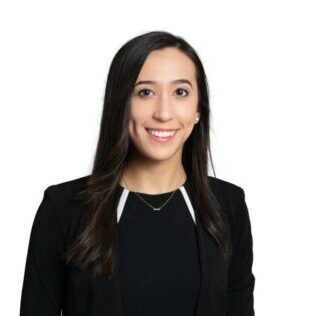Calista Dominy is originally from Philadelphia, Pennsylvania, where she played varsity volleyball and worked part-time in software development. She attended the University of Pennsylvania for college, where she majored in biomedical engineering, minored in engineering entrepreneurship, and worked as a teaching assistant for the computer science department. While at Penn, Calista engaged in a variety of projects in the med-tech space: First, she and a co-founder developed a patient education app that informed patients about their upcoming medical procedures. Additionally, she worked at a pediatric oncology data science lab at the Children’s Hospital of Philadelphia writing algorithms to analyze antibiotic resistance in solid cancer patients. Next, she worked with a team on a year-long project creating a prototype strategy and go-to-market plan for an ingestible device that collected images of a patient’s gastrointestinal tract for diagnostic purposes. Lastly, her senior thesis in biomedical engineering focused on the history of intrauterine device development and future strategies to improve the field. After her undergraduate studies, she enrolled at the Icahn School of Medicine at Mount Sinai (ISMMS). While at ISMMS, Calista performed computational clinical research, focusing on using machine learning to predict pediatric vs. adult cancer outcomes and on using natural language processing to understand the patient perspective on different aspects of healthcare across several social media platforms. She has numerous first-author publications and has presented at national and international conferences. She also won the Women’s Impact Award from the Diversity Innovation Hub at Mount Sinai for her and a co-founder’s project: 3iuD, a 3D-printed intrauterine contraceptive device that is custom designed and fitted to an individual’s uterus using transvaginal ultrasound technology. She is currently in the process of building out a team and a prototype. Lastly, she volunteered at Mount Sinai’s multidisciplinary neuromuscular clinic that provides integrative, multi-specialty care for cerebral palsy patients and their families. She assisted providers clinically and facilitated research survey distribution and administration to patients and their families. Currently, she is going into pediatrics for her residency with the goal of becoming a pediatric cardiologist who performs large-data clinical research and works with device companies in the cardiology space.
- Distinction in Research Graduation Award at the Icahn School of Medicine at Mount Sinai (2023)
- Women’s Impact Award at Diversity Innovation Hub Pitch Competition at Mount Sinai (2022)
- Multiple skull base defects in the setting of spontaneous cerebrospinal fluid rhinorrhea; a dual institution view. Peter Filip, Evan A Patel, Sarah Khalife, Ali M Baird, Calista Dominy, Krishna Joshi, Rui Feng, Stephan Munich, Milena Stosic, Aimee J Szewka, Raj Shrivastava, Satish Govindaraj, Peter Papagiannopoulos, Pete S Batra, Bobby A Tajudeen. American Journal of Otolaryngology. 2023.
- Association Between Age-Stratified Cohorts and Perioperative Complications and 30-Day and 90-Day Readmission in Patients Undergoing Single Level Anterior Cervical Discectomy and Fusion. Brandon Yeshoua, Sirjanhar Singh, Helen Liu, Nima Assad, Calista Dominy, Sara Pasik, Justin Tang, Akshar Patel, Kush Shah, William Ranson, Jun Kim, Samuel Cho. Clinical Spine Surgery. 2023.
- Epidemiology of Pediatric Trauma and Fractures During and Beyond the Covid-19 Pandemic. Liam R. Butler, BS, Erin Abbott, BA, Paulos Mengsteab, PhD, Calista L. Dominy, BS, Jashvant Poeran, MD, PhD, Abigail K. Allen, MD, Sheena C. Ranade, MD. Journal of Children’s Orthopedics. 2023.
- Risk factors for 90-day readmission and prolonged length of stay after hip surgery in children with cerebral palsy. Liam R. Butler; Calista L. Dominy; Christopher A. White; Paulos Mengsteab; Elaine Lin; Abigail K. Allen; Sheena C. Ranade. Journal of Orthopaedics. 2023.
- Previous Emergency Department Admission Is Associated With Increased 90-Day Readmission Following Cervical Spine Surgery: Evidenced Using Propensity Score Matching. Uchechukwu O Amakiri, Calista Dominy, Anish Kumar, Varun Arvind, Nicholas L Pitaro, Jun S Kim, Samuel K Cho. Clinical Spine Surgery. 2023.
- Robust Prediction of Nonhome Discharge Following Elective Anterior Cervical Discectomy and Fusion using Explainable Machine Learning. Eric A. Geng, BA, Jonathan S. Gal MD, Jun S. Kim, MD, Michael L. Martini, MD,PhD, Jonathan Markowitz, MD, Sean N. Neifert, MD, Justin E. Tang, BS, Kush C. Shah, BA, Christopher A. White, BA, Calista Dominy, BS, Aly A. Valliani, BA, Akiro H. Duey, BS, Gavin Li, BS, Bashar Zaidat, BS, Brian Bueno, BS, John M. Caridi MD, Samuel K. Cho, MD. European Spine Journal. 2023.
- Art and Science of Medicine Course Teaching Assistant at the Icahn School of Medicine at Mount Sinai (2023-2024)
- Creator of ‘Python for Clinical Database Research’ Course at the Icahn School of Medicine at Mount Sinai (2023-2024)
- Introduction to Computer Science Teaching Assistant at the University of Pennsylvania (2016-2020)
- Engineering Entrepreneurship Teaching Assistant at the University of Pennsylvania (2020)
